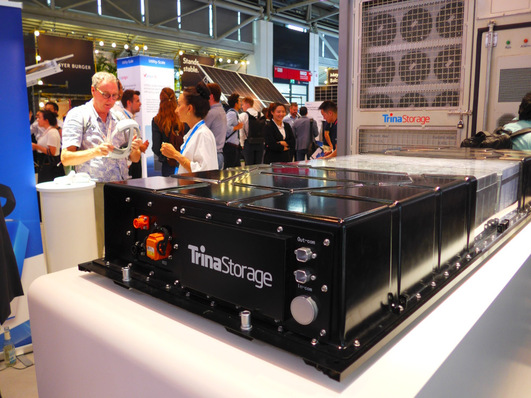Efficient storage technology is crucial for equipping our systems for the renewable energy mix of the future. At the renowned international ees exhibitions, the global energy storage industry presents groundbreaking products and solutions for stationary and mobile electrical energy storage. Particularly innovative solutions have been presented with the ees AWARD at the annual Munich event since 2014. Selected by an independent panel of six judges, the winners reflect the industry trends with their developments and set the course for the years ahead. They also enjoy a great deal of additional exposure thanks to the ees AWARD’s prestige. The winners of the ees AWARD 2019 are:
Blue Solutions (France): LMP (Lithium Metal Polymer) 250/400 rack – modular, heat- resistant storage system
Blue Solutions, a member of the French Bolloré Group, develops and markets solutions for electricity production, storage, and management. The company reached a milestone in its history when it developed the first stationary energy storage system with a solid-state Lithium Metal Polymer battery.
The panel of judges was impressed by the high level of safety and performance offered by this solution. The modular racks house the battery as well as a controller and are designed for simplified installation and maintenance. LMP batteries do not contain liquid electrolytes and can be operated at up to 105° Celsius without the need for cooling. This makes them particularly well suited for use in regions with high ambient temperatures. LMP technology does not use solvents, cobalt or other rare minerals, and the batteries’ metallic lithium allows them to be recycled.

Enerox(Austria): CellCube FB 500-2000 – high-output storage device for photovoltaic systems
Exceptional Austrian engineering – Enerox is part of the CellCube Energy Storage Systems family and incorporates outstanding technology into the research, design, manufacture and sale of the integrated CellCube ESS. The CellCube storage system is one of the first in the industry to offer vanadium redox flow (VRF) batteries with a 1,000 volt DC range. The system is based on VRF technology which stores energy in vanadium electrolyte tanks. The scalable, high-performance 250 kilowatt units can be used in large-scale solar parks and wind farms, self-sufficient building solutions, and stand-alone grids.
The judges also commended the business model of “electrolyte as a service”, representing an innovation in the field of flow batteries. It helps overcome the major investment cost barrier by driving capital costs below 300 euros per kilowatt hour.
Maschinenfabrik Reinhausen (Germany): GRIDCON PCS 4W – variable storage inverter for maximum energy quality
The GRIDCON PCS 4W power conversion system is a modular, bidirectional storage inverter for on- grid and off-grid applications. Designed as a four-wire system, it can be operated as a TN grid without the need to install additional transformers. The inverter was developed by Maschinenfabrik Reinhausen, which was founded in 1868 and is based in Regensburg, Germany. It is a global supplier of power filters and battery inverters in distribution grids.

Dubbing it the “Swiss army knife of inverters”, the judges of the ees AWARD 2019 noted its holistic approach to maximizing power quality. The central DC bus enables the connection of different loads and feeders such as various kinds of batteries and PV units. This means the device can be used in the construction of stable stand-alone systems for micro grid applications as well as convenient solutions for supplying emergency and back-up power. (HCN)
Stay informed, get our free newsletter twice a week. Register here







